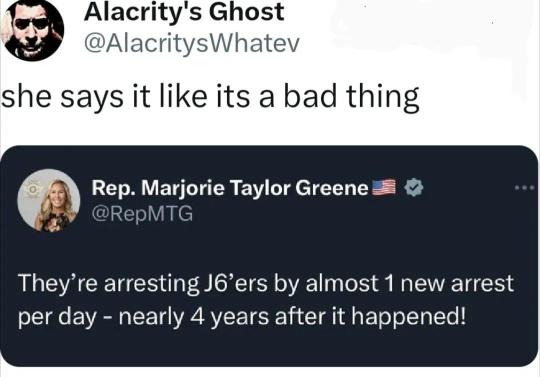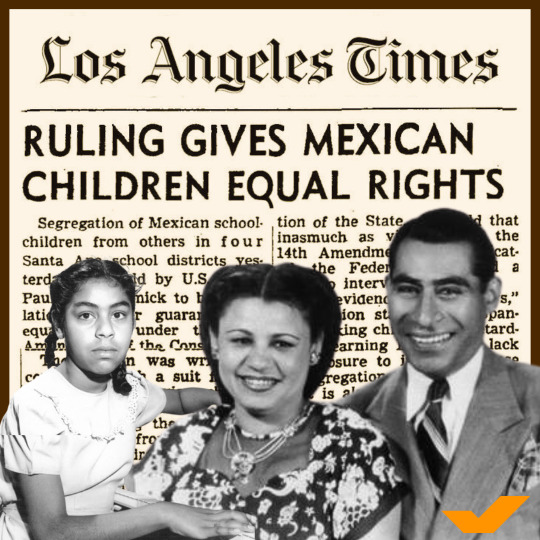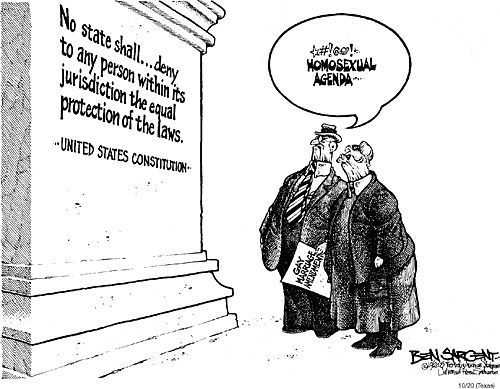#fourteenth amendment
Explore tagged Tumblr posts
Text


I think the rioters thought if they didn't manage to overthrow the election, they would just go home to their Hallmark channel existence and nothing would happen. Consequences weren't for them.
2K notes
·
View notes
Photo

When farmers Gonzalo and Felicitas Mendez sent their children to a local California school in 1945, school officials said they had to go to a separate facility reserved for Mexican American students. Angered by this discrimination, the Mendez family recruited other immigrant parents for a federal court case challenging the school segregation.
On this day 77 years ago, a Circuit Court made a final ruling in their favor — stating segregated education denied the Mexican American students their equal protection rights under the 14th Amendment.
The Mendez v. Westminster decision paved the way for the landmark Brown v. Board of Education case in 1954, and is a clear example of Mexican Americans fighting for their rights — and winning. 🙌🏽
#mendez v westminster#brown v board of education#california#14th amendment#fourteenth amendment#mexican americans#immigrant rights#mexican american rights#school segregation#segregation#history
40 notes
·
View notes
Text
Source
#🇲🇽#usa#united states#history#racism#indigenous#native#discrimination against mexicans#blood quantum#treaty of hidalgo guadalupe#mexican american war#my saved tiktok videos#dr. ramiro conteras#citizenship#mexico#fourteenth amendment#ricardo rodriguez#1897#timoteo andrade#1935#land ownership#marriage equality#voting rights
7 notes
·
View notes
Text
14th Amendment Section 3
Now, I'm no lawyer. My main interaction with the law has been trying to avoid it, but I have thoughts:
People and pundits are pooh-poohing the findings of Colorado and Maine courts, now joined by Illinois, that determined Trump was disqualified from their ballots by violating Section 3 of the 14th Amendment. In their minds, no state-level action should be allowed to play such a large role in a national election.
But Section 3 of the 14th has been in the Constitution so revered by conservatives for over 150 years. The three states mentioned had trials heard by judges where all parties could present their case. All three found Trump had violated the terms of Section 3. The law is clear, he must be disqualified.
If the conservatives can feel entitled to disregard an article of the Constitution to serve their needs, I suggest others can take a more nuanced look at other Amendments. Perhaps the Second? Maybe we can disregard any interpretation of it that allows possession of firearms wily-nilly?
Good for the goose, sauce for the gander.
29 notes
·
View notes
Text
Protecting the Meaning and Value of American Citizenship
Issued January 20, 2025.
By the authority vested in me as President by the Constitution and the laws of the United States of America, it is hereby ordered:
Section 1. Purpose. The privilege of United States citizenship is a priceless and profound gift. The Fourteenth Amendment states: "All persons born or naturalized in the United States, and subject to the jurisdiction thereof, are citizens of the United States and of the State wherein they reside." That provision rightly repudiated the Supreme Court of the United States's shameful decision in Dred Scott v. Sandford, 60 U.S. (19 How.) 393 (1857), which misinterpreted the Constitution as permanently excluding people of African descent from eligibility for United States citizenship solely based on their race.
But the Fourteenth Amendment has never been interpreted to extend citizenship universally to everyone born within the United States. The Fourteenth Amendment has always excluded from birthright citizenship persons who were born in the United States but not "subject to the jurisdiction thereof." Consistent with this understanding, the Congress has further specified through legislation that "a person born in the United States, and subject to the jurisdiction thereof" is a national and citizen of the United States at birth, 8 U.S.C. 1401, generally mirroring the Fourteenth Amendment's text.
Among the categories of individuals born in the United States and not subject to the jurisdiction thereof, the privilege of United States citizenship does not automatically extend to persons born in the United States: (1) when that person's mother was unlawfully present in the United States and the father was not a United States citizen or lawful permanent resident at the time of said person's birth, or (2) when that person's mother's presence in the United States at the time of said person's birth was lawful but temporary (such as, but not limited to, visiting the United States under the auspices of the Visa Waiver Program or visiting on a student, work, or tourist visa) and the father was not a United States citizen or lawful permanent resident at the time of said person's birth.
Sec. 2. Policy. (a) It is the policy of the United States that no department or agency of the United States government shall issue documents recognizing United States citizenship, or accept documents issued by State, local, or other governments or authorities purporting to recognize United States citizenship, to persons: (1) when that person's mother was unlawfully present in the United States and the person's father was not a United States citizen or lawful permanent resident at the time of said person's birth, or (2) when that person's mother's presence in the United States was lawful but temporary, and the person's father was not a United States citizen or lawful permanent resident at the time of said person's birth.
(b) Subsection (a) of this section shall apply only to persons who are born within the United States after 30 days from the date of this order.
(c) Nothing in this order shall be construed to affect the entitlement of other individuals, including children of lawful permanent residents, to obtain documentation of their United States citizenship.
Sec. 3. Enforcement. (a) The Secretary of State, the Attorney General, the Secretary of Homeland Security, and the Commissioner of Social Security shall take all appropriate measures to ensure that the regulations and policies of their respective departments and agencies are consistent with this order, and that no officers, employees, or agents of their respective departments and agencies act, or forbear from acting, in any manner inconsistent with this order.
(b) The heads of all executive departments and agencies shall issue public guidance within 30 days of the date of this order regarding this order's implementation with respect to their operations and activities.
Sec. 4. Definitions. As used in this order:
(a) "Mother" means the immediate female biological progenitor.
(b) "Father" means the immediate male biological progenitor.
Sec. 5. General Provisions. (a) Nothing in this order shall be construed to impair or otherwise affect:
(i) the authority granted by law to an executive department or agency, or the head thereof; or
(ii) the functions of the Director of the Office of Management and Budget relating to budgetary, administrative, or legislative proposals.
(b) This order shall be implemented consistent with applicable law and subject to the availability of appropriations.
(c) This order is not intended to, and does not, create any right or benefit, substantive or procedural, enforceable at law or in equity by any party against the United States, its departments, agencies, or entities, its officers, employees, or agents, or any other person.
2 notes
·
View notes
Text
youtube
Lawyers address the destruction of the 14th Amendment.
#14 amendment#fourteenth amendment#us constitution#United States Constitution#birthright citizenship#fuck conservatives#fuck republicans#fight project 2025#project 2025#fuck the police#fuck trump#survive out of spite#republicans are domestic terrorists#republicans are evil#stupid republicans#republicans are weird#republicans suck#fuck the republikkkans#republicans are fascists#republicans are nazis#republicans are garbage#republicans are the problem#republicans don't care about you#maga is a cult#magats#maga morons#maga cult#fuck maga#donald trump is evil#trump is a criminal
2 notes
·
View notes
Text
On September 3, 1901, Alabama adopted a new state constitution that prohibited interracial marriage and mandated separate schools for Black and white children. The state constitutional convention’s primary purpose was to legally disenfranchise Black voters, and the new constitution also included several electoral policies designed to suppress Black political power.
Framers of this constitution knew that, because the Fourteenth Amendment prohibited race-based disenfranchisement, discriminatory constitutional provisions intended to maintain white supremacy had to appear race-neutral. To that end, the new constitution called for the appointment of three registrars from each county who had wide discretion when accepting registration applications and were chosen and trained to minimize registration by African Americans.
The constitution’s new registration rules also required voters to be able to read and write any section of the U.S. Constitution and have been lawfully employed for the previous 12 months. Anyone who did not meet the employment specification could still register if he or his wife had real estate and possessions taxed at $300. Though these requirements had severely limited the voting rights of African Americans and poor white people in Alabama, the constitutional drafters provided exceptions that allowed voters to register anyway if they were voters, descendants of voters, or could demonstrate an understanding of the U.S. Constitution. This provision offered a loophole much more likely to apply to white men (who had been eligible for military service in the South). The effect was intentional.
Alabama was home to approximately 75,000 registered African American voters before the new constitution was enacted, but drafters estimated the new rules would reduce that number to less than 30,000. Alabama delegates approved the constitution 132-12. The state amended the 1901 constitution since its adoption, but several of the discriminatory provisions of the 1901 constitution—including the mandate to maintain racially segregated public schools—remained until 2022.
#history#white history#us history#am yisrael chai#jumblr#republicans#black history#democrats#vote#voter#farmers#Fourteenth Amendment#U.S. Constitution
2 notes
·
View notes
Text

[Clay Jones]
* * * *
LETTERS FROM AN AMERICAN
March 30, 2024
HEATHER COX RICHARDSON
MAR 31, 2024
On Tuesday morning, on his social media outlet, former president Trump encouraged his supporters to buy a “God Bless The USA” Bible for $59.99. The Bible is my “favorite book,” he said in a promotional video, and said he owns “many.” This Bible includes the U.S. Constitution, the Bill of Rights, the Declaration of Independence, and the Pledge of Allegiance. It also includes the chorus of country music singer Lee Greenwood’s song “God Bless the USA,” likely because it is a retread of a 2021 Bible Greenwood pushed to commemorate the twentieth anniversary of 9-11.
That story meant less coverage for the news from last Monday, March 25, in which Trump shared on his social media platform a message comparing him to Jesus Christ, with a reference to Psalm 109, which calls on God to destroy one’s enemies.
This jumped out to me because Trump is not the first president to compare himself to Jesus Christ. In 1866, President Andrew Johnson famously did, too. While there is a financial component to Trump’s comparison that was not there for Johnson, the two presidents had similar political reasons for claiming a link to divine power.
Johnson was born into poverty in North Carolina, then became a tailor in Tennessee, where he rose through politics to the U.S. House of Representatives and then the Senate. In 1861, when Tennessee left the Union, Johnson was the only sitting senator from a Confederate state who remained loyal to the United States. This stand threw him into prominence. In 1862, President Abraham Lincoln named him the military governor of Tennessee.
Then, in 1864, the Republican Party renamed itself the Union Party to attract northern Democrats to its standard. To help that effort, party leaders chose a different vice president, replacing a staunch Republican—Hannibal Hamlin of Maine—with the Democrat Johnson.
Although he was elected on what was essentially a Republican ticket, Johnson was a Democrat at heart. He loathed the elite southern enslavers he thought had become oligarchs in the years before the Civil War, shutting out poorer men like him from prosperity, but he was a fervent racist who enslaved people himself until 1863. Johnson opposed the new active government the Republicans had built during the war, and he certainly didn’t want it to enforce racial equality. He expected that the end of the war would mean a return to the United States of 1860, minus the system of enslavement that concentrated wealth upward.
Johnson was badly out of step with the Republicans, but a quirk of timing gave him exclusive control of the reconstruction of the United States from April 15, 1865, when he took the oath of office less than three hours after Lincoln breathed his last, until early December. Congress had adjourned for the summer on March 4, expecting that Lincoln would call the members back together if there were an emergency, as he had in summer 1861. It was not due to reconvene until early December. Members of Congress rushed back to Washington, D.C., after Lincoln’s assassination, but Johnson insisted on acting alone.
Over the course of summer 1865, Johnson set out to resuscitate the prewar system dominated by the Democratic Party, with himself at its head. He pardoned all but about 1,500 former Confederates, either by proclamation or by presidential pardon, putting them back into power in southern society. He did not object when southern state legislatures developed a series of state laws, called Black Codes, remanding Black Americans into subservience.
When Congress returned to work on December 4, 1865, Johnson greeted the members with the happy news that he had “restored” the Union. Leaving soldiers in the South would have cost tax money, he said, and would have “envenomed hatred” among southerners. His exclusion of Black southerners from his calculus, although they were the most firmly loyal population in the South, showed how determined he was to restore prewar white supremacy, made possible by keeping power in the states. All Republican congressmen had to do, he said, was to swear in the southern senators and representatives now back in Washington, D.C., and the country would be “restored.”
Republicans wanted no part of his “restoration.” Not only did it return to power the same men who had been shooting at Republicans’ constituents eight months before and push northerners’ Black fellow soldiers to a form of quasi-enslavement, but also the 1870 census would count Black Americans as whole people rather than three fifths of a person, giving former Confederates more national political power after the war than they had had before it. Victory on the battlefields would be overturned by control of Congress.
Congressional Republicans rejected Johnson’s plan for reconstruction. Instead, they passed the Fourteenth Amendment in June 1866 and required the former Confederate states to ratify it before they could be readmitted to the United States. The Fourteenth Amendment put the strength of the national government behind the idea that Black Americans would be considered citizens—as the Supreme Court’s 1857 Dred Scott decision had denied. Then it declared that states could neither discriminate against citizens nor take away a citizen’s rights without due process of the law. To make sure that the 1870 census would not increase the power of former Confederates, it declared that if any state kept men over 21 from voting, its representation in Congress would be reduced proportionally.
Johnson hated the Fourteenth Amendment. He hated its broad definition of citizenship; he hated its move toward racial equality; he hated its undermining of the southern leaders he backed; he hated its assertion of national power; he hated that it offered a moderate route to reunification that most Americans would support. If states ratified it, he wouldn’t be able to rebuild the Democratic Party with himself at its head.
So he told southern politicians to ignore Congress’s order to ratify the Fourteenth Amendment, calling Congress an illegal body because it had not seated representatives from the southern states. He promised white southerners that the Democrats would win the 1866 midterm elections. Once back in power, he said, Democrats would repudiate the Republicans’ “radicalism” and put his plan back into place.
As he asserted his vision for the country, Johnson egged on white supremacist violence. In July, white mobs attacked a Unionist convention in New Orleans where delegates had called for taking the vote away from ex-Confederates and giving it to loyal Black men. The rioters killed 37 Black people and 3 white delegates to the convention.
By then, Johnson had become as unpopular as his policies. Increasingly isolated, he defended his plan for the nation as the only true course. In late August he broke tradition to campaign in person, an act at the time considered beneath the dignity of a president. He set off on a railroad tour, known as the “Swing Around the Circle,” to whip up support for the Democrats before the election.
Speaking from the same set of notes as the train stopped at different towns and cities from Washington, D.C., to New York, to Chicago, to St. Louis, and back to Washington, D.C., Johnson complained bitterly about the opposition to his reconstruction policies, attacked specific members of Congress as traitors and called for them to be hanged, and described himself as a martyr like Lincoln. And, noting the mercy of his reconstruction policies, he compared himself to Jesus.
It was all too much for voters. The white supremacist violence across the South horrified them, returning power to southern whites infuriated them, the reduction of Black soldiers to quasi-slaves enraged them, and Johnson’s attacks on Congress alarmed them. Johnson seemed determined to hand the country over to its former enemies to recreate the antebellum world that northerners had just poured more than 350,000 lives and $5 billion into destroying, no matter what voters wanted.
Johnson’s extremism and his supporters’ violence created a backlash. Northerners were not willing to hand the country back to the Democrats who were rioting in the South and to a president who compared himself to Jesus. Rather than turning against the Republicans in the 1866 elections, voters repudiated Johnson. They gave Republicans a two-thirds majority of Congress, enabling them to override any policy Johnson proposed.
And, in 1868, the states ratified the Fourteenth Amendment to the Constitution, launching a new era in the history of the United States.
LETTERS FROM AN AMERICAN
HEATHER COX RICHARDSON
#history#Andrew Johnson#Civil War#political#Heather Cox Richardson#Letters From An American#Fourteenth Amendment
5 notes
·
View notes
Text


#US Constitution#Fourteenth Amendment#Marbury vs Madison#Constitutional Law#cartoon#editorial cartoon
11 notes
·
View notes
Text
Exactly! Executive branch under threat, judicial branch not impartial. In fact gone rogue. Legislative branch. Only has one legitimate political party.
The constitution is crystal clear about what we should do when someone like dickless tries to execute a coup. Proof of his guilt Is on video, it’s in emails, it’s in text messages , it’s recorded on phone calls. It’s also completely premeditated. “ just tell them the election was rigged and I’ll take care of the rest”. Said a month before we voted.
Madison is rolling in his grave right now. We have to fight this. We can’t let our country burn.
#fuckyoutrumpyoucocksucker#donaldjtrump#dictatortrump#fourteenth amendment#corruption#depends#poopypants#rapist
3 notes
·
View notes
Text

John Darkow - Columbia Missourian
#Trump Campaign#election#GOP#vote blue#biden harris 2024#november election#Taylor Swift#JFK#rfk#rfk jr#fascisim#stop fascisim#MAGA#Supreme Court#Sedition#Treason#Insurrection#Failed Coup#jan 6#j6#january 6#Fourteenth amendment#treason
1 note
·
View note
Text
The First and Fourteenth Amendments and Discrimination
In the wake of the Supreme Court's decision in 303 Creative v. Elenis, the so-called "gay website case," I have seen a ton of just terrible takes arguing what the law does and does not say about discrimination and what the Supreme Court has said.
The simplest version is, the Supreme Court ruled that, if you are engaged in expressly creative services, the state cannot compel you to make a message with which you disagree. The Court did not say that one can broadly discriminate against protected classes in general services. The 14th Amendment says, "No State shall... deny to any person within its jurisdiction the equal protection of the laws." Here, "state" also means any government entity, smaller or larger than the state.
Through successive civil rights acts, the Supreme Court and various Federal and State legislatures have clarified that this means that "places of public accommodation" cannot deny services based on someone's race, color, religion, sex, or national origin. Public accommodations, under these laws, generally means facilities or business, publicly or privately owned, which are generally opened to the public. If you offer a service or a good to the people at large, in a brick and mortar facility or exclusively online, you cannot deny standard services to people because of their race, color, religion, sex, or national origin. In some places, sexual orientation and gender identity have been added to this list.
If you sell something to the public, you have to sell it to black people or women, even if you hate those groups. However, none of these rules prohibit you from denying services to people for basically any other reason.
Except in a few locations, such as Washington DC, and Madison, Wisconsin, political belief and viewpoint discrimination is completely legal. A business has always been allowed to deny services to someone for being a Republican or a Democrat or a Communist or a Nazi. Business are even allowed to fire employees for their political beliefs and expressions in most cases, as happened when a Berkeley, California hot dog business fired an employee for marching in the "United The Right" rally in Charlottesville, Virginia.
The First Amendment says, "Congress shall make no law... abridging the freedom of speech." The Supreme Court has also ruled, repeatedly, that "freedom of speech" means "freedom of expression, so the "speech" need not be spoken, but any sort of creative expression one wishes to engage in.
In West Virginia State Board of Education v Barnette (1943), the Supreme Court ruled that the state, in the form of the local public school, could not force a student to say the pledge of allegiance. Writing for the court, Justice Robert Jackson said: "If there is any fixed star in our constitutional constellation, it is that no official, high or petty, can prescribe what shall be orthodox in politics, nationalism, religion, or other matters of opinion or force citizens to confess by word or act their faith therein."
Just like you have the freedom to speak and say what you'd like, you also have the right to be free from the government ordering you to express yourself in ways you find repugnant.
In 303 Creative v Elenis, (2023), a web designer, Laurie Smith, sued the State of Colorado to prevent them from enforcing a rule which would have required her to serve gay people. Sexual Orientation, in the state of Colorado, is a protected class. According to the public accommodation and protected class rules discussed above, this should be pretty clear, that Smith must provide service to the [hypothetical] gay couple that wanted her to build a wedding website. What she argued, however, was that if the state forced her to engage in the "inherently creative" expression of web design. The court agreed that for specific cases, where the public accommodation engaged in inherently creative services, the state could not compel someone through threat of criminal liability, to engage in that speech.
The court did NOT overrule the entirety of the Civil Rights architecture in the United States. No business can now decide they do not have to sell or serve protected classes if they don't want to. If you sell cheeseburgers, you are not now cleared to not sell those cheeseburgers to black people or gay people. Subway "sandwich artists" are not "inherently creative" in a way that would allow them to deny their service to protected classes either, as the service itself must be creative and providing the message to which one objects. There is nothing about the selling of an even spectacularly creative sandwich to a gay couple would not convey any meaning.
Nor does this decision mean suddenly you can engage in viewpoint discrimination against non-protected classes. You always could and, unless something changes radically, always will be able to. If you want to deny me service or refuse to sell me a bottle of water because I have a shirt with a message you disagree with, you are allowed to do that.
3 notes
·
View notes
Text
Excerpt:
“The Fourteenth Amendment was intended to extend full citizenship to formerly enslaved Black people, and it undergirds the right of all Americans to be treated equally under the law, no matter who they are or in which state they reside. Yet over the past year, conservatives have been increasingly open in their beliefs that pregnant women, transgender adolescents, affirming parents of trans kids, and immigrants are not legally entitled to the Fourteenth Amendment’s protections—all while arguing that fertilized eggs are. Republicans are using strategic litigation to effectively rewrite the Fourteenth Amendment to prioritize conservative white men and embryos above and beyond everyone else. They are warping something used to grant rights into a bludgeon to take them away, and are redefining who counts as a person in the United States.”
0 notes
Text
Supreme Court Ruling on Affirmative Action and Impact on Companies’ DEI Programs
In June 2023, the US Supreme Court voted 6-3 in a decision that significantly changed the way colleges and universities used affirmative action in their admissions. The targets of the lawsuit were Harvard University and University of North Carolina for alleged racial discrimination in admissions. The Ruling The Court ruled that race conscious college admission policies aimed at maintaining…
#14th Amendment#Admissions#affirmative action#civil rights act#College#DEI#diversity equity and inclusion#Equal Protection Clause#Fourteenth Amendment#Harvard University#racial discrimination#SCOTUS#SHRM#Society for Human Resources Management#Title VII#University of North Carolina#US Supreme Court
0 notes
Text
On September 8, 1910, the Texas House of Representatives overwhelmingly approved a resolution encouraging U.S. senators and congressmen to work toward repealing the Fourteenth Amendment, which granted citizenship to Black people born in the U.S.
The resolution was introduced by Representative Robert Yantis, who initially also advocated for the repeal of the Fifteenth Amendment, which granted African American men the right to vote in the U.S.
During the House session on September 8, Representative Yantis argued that “the perpetuity of Caucasian supremacy depended on the disenfranchisement of the negro.” He added that “in the heart of every negro [is] a desire for social equality and Texas ought to take the initiative in securing the repeal of the amendment.” The resolution passed with a vote of 51-34.
Opposition to the Fourteenth Amendment began before it even became an enforceable part of the Constitution. After the amendment was passed by the Senate in 1866, 28 of the 37 states had to ratify it. Southern legislatures refused; 10 of the 11 former Confederate states rejected the amendment with overwhelming majorities, and Louisiana did so unanimously.
The Fourteenth Amendment was finally adopted in July 1868, after Congress imposed military rule on the South and required states seeking readmission to the Union to ratify the amendment.
#history#white history#us history#am yisrael chai#jumblr#republicans#black history#democrats#Texas House of Representatives#House of Representatives#Texas#U.S. senator#congressman#14th amendment#14 amendment#fourteenth amendment#Fourteenth Amendment#Representative Robert Yantis#Robert Yantis#Fifteenth Amendment#15 Amendment#15th Amendment#Caucasian supremacy#white supremacy#white privelage#white tears#white men#white women#white kids#kids
0 notes